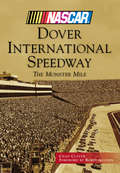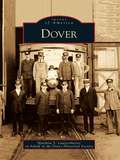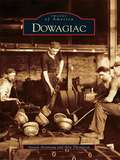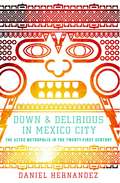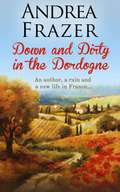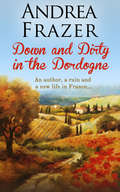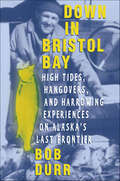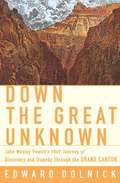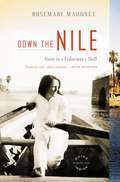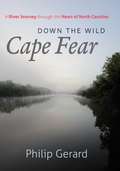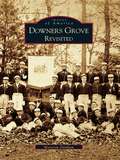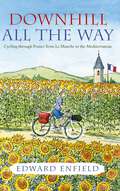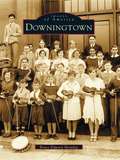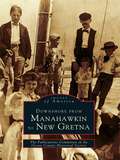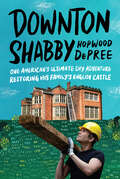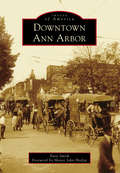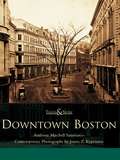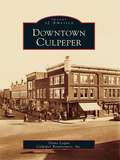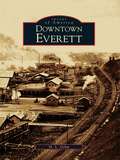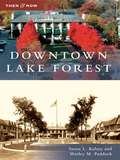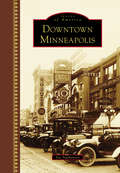- Table View
- List View
Dover International Speedway: The Monster Mile
by Chad Culver Bobby AllisonIn the fertile farmlands of Delaware, there is a monster--a one-mile, concrete oval that has earned a reputation for being one of the toughest NASCAR® tracks since its first race in 1969. Built upon a farmer's field and airstrip, Dover International Speedway has a story filled with dreams and determination. From Richard Petty's first win at the speedway in 1969 through today's modern NASCAR heroes, "The Monster Mile" has witnessed some of racing's most memorable moments and continues to provide some of the best racing in NASCAR to this day. Many rare images have been gathered to provide a never-before-seen look at this historic speedway. Take a journey through time on one of the toughest, fastest, and most unique tracks ever built.
Dover: Proceedings Of The One Hundred And Twenty-fifth Anniversary Of The Incorporation Of The Town Of Dover, Massachusetts, Wednesday, July 7, 1909 (classic Reprint) (Images of America)
by Dover Historical Society Matthew S. LautzenheiserIn 1807, Christian Deardorff and Jesse Slingluff set out for the Ohio frontier. Before leaving, the men laid out the plat of a village that would sit at the banks of the Tuscarawas River. Over the next 10 years as Deardorff toiled away in his bachelor cabin, he held on to the dream of building his vision. The original plat map the two men devised contained 256 lots with land set aside for churches, schools, and a spacious downtown square. Today, over 200 years after Slingluff and Deardorff filed their plat at Zanesville, Dover continues to reflect their vision of a pleasant little town situated on the Tuscarawas River.
Dowagiac
by Ann Thompson Steven ArseneauThe story of Dowagiac's first 100 years may ring familiar to other small cities across the United States. After Dowagiac was established on a railroad line in 1848, new settlers arrived and had the opportunity to establish large-scale factories in the young village. This growth would last for afull century, fueled by the Round Oak Stove Company and other manufacturers in the city. Because of its manufacturing base, immigrants moved to Dowagiac, and the small city enjoyed strong business and manufacturing districts, solid educational institutions, and a vibrant social life. Surrounding lakes provided one venue for entertainment, while downtown Dowagiac offered theaters and fairs. This book documents and celebrates the history of Dowagiac with over 200 photographs from the collection of the Museum at Southwestern Michigan College.
Down and Delirious in Mexico City
by Daniel HernandezMEXICO CITY, with some 20 million inhabitants, is the largest city in the Western Hemisphere. Enormous growth, raging crime, and tumultuous politics have also made it one of the most feared and misunderstood. Yet in the past decade, the city has become a hot spot for international business, fashion, and art, and a magnet for thrill-seeking expats from around the world. In 2002, Daniel Hernandez traveled to Mexico City, searching for his cultural roots. He encountered a city both chaotic and intoxicating, both underdeveloped and hypermodern. In 2007, after quitting a job, he moved back. With vivid, intimate storytelling, Hernandez visits slums populated by ex-punks; glittering, drug-fueled fashion parties; and pseudo-native rituals catering to new-age Mexicans. He takes readers into the world of youth subcultures, in a city where punk and emo stand for a whole way of life--and sometimes lead to rumbles on the streets. Surrounded by volcanoes, earthquake-prone, and shrouded in smog, the city that Hernandez lovingly chronicles is a place of astounding manifestations of danger, desire, humor, and beauty, a surreal landscape of "cosmic violence." For those who care about one of the most electrifying cities on the planet, "Down & Delirious in Mexico City is essential reading" (David Lida, author of First Stop in the New World).
Down and Dirty in the Dordogne
by Andrea FrazerThis is the story of how two middle-aged Brits gave up a nice life in Blighty after falling in love with a delightfully dilapidated old French property. It's no mean feat trying to restore a cavernous barn of a house (hovel) during the worst financial crisis of the modern age, especially when you're faced with dodgy builders, red tape, rowdy locals, health problems, recalcitrant relatives, a house in England that simply won't sell, and a multitude of escapologist cats - not to mention some resident skeletons. Andrea Frazer gives the lowdown on the ups and downs that befall two fish out of water as the couple take the plunge and move across the Channel.
Down and Dirty in the Dordogne
by Andrea FrazerThis is the story of how two middle-aged Brits gave up a nice life in Blighty after falling in love with a delightfully dilapidated old French property.It’s no mean feat trying to restore a cavernous barn of a house (hovel) during the worst financial crisis of the modern age, especially when you’re faced with dodgy builders, red tape, rowdy locals, health problems, recalcitrant relatives, a house in England that simply won’t sell, and a multitude of escapologist cats – not to mention some resident skeletons.Andrea Frazer gives the lowdown on the ups and downs that befall two fish out of water as the couple take the plunge and move across the Channel.
Down and Dirty in the Dordogne
by Andrea FrazerThis is the story of how two middle-aged Brits gave up a nice life in Blighty after falling in love with a delightfully dilapidated old French property.It’s no mean feat trying to restore a cavernous barn of a house (hovel) during the worst financial crisis of the modern age, especially when you’re faced with dodgy builders, red tape, rowdy locals, health problems, recalcitrant relatives, a house in England that simply won’t sell, and a multitude of escapologist cats – not to mention some resident skeletons.Andrea Frazer gives the lowdown on the ups and downs that befall two fish out of water as the couple take the plunge and move across the Channel.
Down in Bristol Bay: High Tides, Hangovers, and Harrowing Experiences on Alaska's Last Frontier
by Bob DurrDr. Robert Allen Durr - literary scholar, award-winning author, former confidant to legendary writer H. L. Mencken, and one-time rising star in the East Coast academic world - decided one day to give it all up and move to a remote region of Alaska in search of paradise. Convinced that truth, beauty, and goodness could still be found in the wild, Durr bought a boat and journeyed to Bristol Bay in hopes of becoming a commercial salmon fisherman and earning a living. Catapulting the reader into this last frontier and onto a sea of storms and dangers, madcap bars and drinking parties, amid the camaraderie of some rugged Alaskans, mostly native fishermen known as D Inn Crowd, Down in Bristol Bay chronicles a hard life, but not without songs and ballads, misadventures and follies, occasionally of burlesque proportions, on land as well as at sea.Combining elements of Krakaur's Into the Wild, Matthiessen's The Snow Leopard, Junger's The Perfect Storm, McPhee's Coming Into the Country, and even Tom Wolfe's The Electric Kool-Aid Acid Test, Down in Bristol Bay is a powerful and raucous memoir of a man who abandoned the safe world of academia for the Alaskan wilderness to find his own kind of primal sanity.
Down the Great Unknown: John Wesley Powell's 1869 Journey of Discovery and Tragedy through the Grand Canyon
by Edward Dolnick0n May 24, 1869, a one-armed Civil War veteran named John Wesley Powell and a ragtag band of nine mountain men embarked on the last great quest in the American West. No one had ever explored the fabled Grand Canyon; to adventurers of that era it was a region almost as mysterious as Atlantis -- and as perilous. The ten men set out down the mighty Colorado River in wooden rowboats. Six survived. Drawing on rarely examined diaries and journals, Down the Great Unknown is the first book to tell the full, true story.
Down the Mississippi with Stinky: Two Women, a Canoe, and a Kitten
by Dorie BrunnerThe true adventures of a trip down the Mississippi from northern Minnesota to New Orleans in 1960.
Down the Nile: Alone in a Fisherman's Skiff
by Rosemary MahoneyRosemary Mahoney was determined to take a solo trip down the Egyptian Nile in a small boat, even though civil unrest and vexing local traditions conspired to create obstacles every step of the way. Starting off in the south, she gained the unlikely sympathy and respect of a Muslim sailor, who provided her with both a seven-foot skiff and a window into the culturally and materially impoverished lives of rural Egyptians. Egyptian women don't row on the Nile, and tourists aren't allowed to for safety's sake. Mahoney endures extreme heat during the day, and a terror of crocodiles while alone in her boat at night. Whether she's confronting deeply held beliefs about non-Muslim women, finding connections to past chroniclers of the Nile, or coming to the dramatic realization that fear can engender unwarranted violence, Rosemary Mahoney's informed curiosity about the world, her glorious prose, and her wit never fail to captivate.
Down the River
by Edward AbbeyA curious look into the life of the Colorado river before the Glen Canyon Dam, as well as a collection of stories of life -- and sometimes death.
Down the Wild Cape Fear
by Philip GerardIn Down the Wild Cape Fear, novelist and nonfiction writer Philip Gerard invites readers onto the fabled waters of the Cape Fear River and guides them on the 200-mile voyage from the confluence of the Deep and Haw Rivers at Mermaid Point all the way to the Cape of Fear on Bald Head Island. Accompanying the author by canoe and powerboat are a cadre of people passionate about the river, among them a river guide, a photographer, a biologist, a river keeper, and a boat captain. Historical voices also lend their wisdom to our understanding of this river, which has been a main artery of commerce, culture, settlement, and war for the entire region since it was first discovered by Verrazzano in 1524. Gerard explores the myriad environmental and political issues being played out along the waters of the Cape Fear. These include commerce and environmental stewardship, wilderness and development, suburban sprawl and the decline and renaissance of inner cities, and private rights versus the public good.
Downers Grove Revisited (Images of America)
by Montrew DunhamOn a May evening in 1832, a solitary 50-year-old man on horseback rode toward an oak grove that rose majestically from the quiet Illinois prairie. Stopping at this beautiful site, the man bent a sapling to mark his claim to the rich Illinois farmland that would be his for the settling. In that singular act, Pierce Downer founded the town that would bear his name: Downers Grove, Illinois.He could hardly have imagined the remarkable development of the bucolic prairie town, 22 miles west of Chicago, as it grew to a thriving suburb with a population of nearly 50,000. Many unique and influential people have shaped the history of Downers Grove.
Downhill all the Way: From La Manche to the Mediterranean by Bike
by Edward EnfieldFed up with questions about what he was going to do when he retired, Edward decided to get on his bicycle and ride from Le Havre to the Mediterranean. Armed with a tent and a smattering of French, he struggled in Normandy to get directions from old men tipsy on Calvados by 9 a.m., and hit his stride on the towpath of the Burgundy canal.
Downhill all the Way: From La Manche to the Mediterranean by Bike
by Edward EnfieldFed up with questions about what he was going to do when he retired, Edward decided to get on his bicycle and ride from Le Havre to the Mediterranean. Armed with a tent and a smattering of French, he struggled in Normandy to get directions from old men tipsy on Calvados by 9 a.m., and hit his stride on the towpath of the Burgundy canal.
Downingtown
by Bruce Edward MowdayFrom the days predating the American Revolution, Downingtown has played a vital part in the development of not only Chester County but also the commonwealth of Pennsylvania and the United States of America. It was an important stop for farmers and tradesmen transporting goods between Lancaster and Philadelphia. During the Philadelphia campaign of the Revolution in 1777, the Continental Congress approved the storage of material for George Washington's army in Downingtown. Situated in the heart of one of William Penn's three original counties of Pennsylvania, the area grew into an important manufacturing community, known for its paper mills fueled by the east branch of the Brandywine River, which flows through the middle of the town.
Downshore From Manahawkin to New Gretna (Images of America)
by The Publications Committee of the Ocean County Historical SocietyA unique area exists along the western shores of Little Egg Harbor Bay and Great Bay between the communities of Manahawkin and New Gretna in the southern coastal section of New Jersey. From the beginning, the region was rich in natural resources, providing fish, clams, oysters, lumber, and cranberries for early settlers. The communities also enjoyed a temperate climate and navigable harbors, leading to the development of shipbuilding and trading as early industries. Because of the isolation of the Tuckerton area from the larger population centers of the state, its small-town flavor and way of life were allowed to endure. Many of the occupations of the settlers of the early 1700s survive to this day. Downshore from Manahawkin to New Gretna seeks to capture the charm of the little towns in this region, the character of the people who settled here, many of whose families still remain, and the lifestyle lived in harmony with this pastoral environment during the nineteenth and early twentieth centuries.
Downton Shabby: One American's Ultimate DIY Adventure Restoring His Family's English Castle
by Hopwood DePreeHGTV meets Downton Abbey! A ready-for-TV story—with charm and humor in abundance—about a Los Angeles producer who moves to England to save his ancestral castle from ruin.“A true delight...In this marvelous debut, film producer DePree leaves the Hollywood hills to resurrect his British ancestral home, a 50,000-square-foot estate in the English countryside. Readers are in for a treat."--Publishers Weekly (starred review)Hollywood producer Hopwood DePree had been told as a boy that an ancestor—who he was named for—had left his family’s English castle in the 1700s to come to America. One night after some wine and a visit to Ancestry.com, Hopwood discovered a photograph of a magnificent English estate with a familiar name: Hopwood Hall, a 60-room, 600-year-old grand manor on 5,000 acres. And with that, Hopwood DePree’s life took an almost fairytale turn.Hopwood Hall, in northwest England, was indeed his family’s ancestral home. It had been occupied continuously by the Hopwood family for five centuries until the last remaining male heirs were killed in World War I. Since then, the Hall had fallen gradually into disrepair and was close to collapse. When Hopwood visited, he discovered trees growing in the chimneys, holes in the roof, and water sluicing down walls. It would take many millions to save the Hall—millions that Hopwood certainly didn’t have—but despite the fact that he lived in Los Angeles and had no construction skills, Hopwood DePree came to a conclusion: He would save Hopwood Hall.Downton Shabby—the name Hopwood coined for the glorious ruin—traces Hopwood DePree’s adventures as he gives up his life in Hollywood and moves permanently to England to save Hopwood Hall from ruin. But the task is far too big for one person, of course. Hopwood discovers that the Hall comes with an unforgettable cast of new neighbors he can call on for help—from the electrician whose mum had fond memories of working at the Hall to gruff caretaker Bob, and the local aristocrats who (sort of) come to accept Hopwood as one of their own. Together, as they navigate the trials and triumphs of trying to save an actual castle, Hopwood finds himself ever further from the security of his old life, but comes to realize that, actually, he’s never been closer to home.
Downtown Ann Arbor
by Patti Smith Mayor John HieftjeIn 1824, John Allen and Elisha Rumsey established the first homestead in what is now downtown Ann Arbor. The story goes that the community got its name when the two founders' wives, both named Ann, were seen lounging in a grove of trees. In reality, Ann Allen and Mary Ann Rumsey were never in town at the same time, but how it actually was named is unimportant when considering what Ann Arbor grew into. Early settlers gave the town schools, an expansive courthouse, a beautiful post office, and streetcar lines that spanned downtown. They built this town, and their legacy is present in every walk up Huron Street, drive down to William and Main Streets, or bike ride over to Kerrytown.
Downtown Boston
by Anthony Mitchell Sammarco James Z. KyprianosSettled in 1630 by English Puritans seeking religious freedom, Boston has always been a city prone to significant and monumental change. Even before it was incorporated as Boston, named after the town of Boston in Lincolnshire, England, the town's name was changed from Shawmut. From that time, Boston has evolved from being the original center of town government at the Old State House to becoming the financial center of New England in the twentieth century.Downtown Boston captures many of Boston's intriguing changes with photographs of the past and present. Since the advent of photography one hundred and fifty years ago, Boston has seen many topographical changes, such as the infilling that created new land in the Dock Square and Long Wharf areas and the rebuilding of the Financial District with magnificent structures that have become a representation of Boston's banking and investment endeavors. At the height of commercial success, the Great Boston Fire of 1872 brought mass devastation-forty acres of the business area were destroyed and downtown Boston had to be rebuilt. Downtown Boston magnificently portrays Boston's rebuilding and rise as a historically beautiful city.
Downtown Culpeper
by Inc. Culpeper Renaissance Diane LoganIn 1749, George Washington, age 17, was commissioned to survey and plot the town and county of Culpeper. He recorded that the town occupied a "high and pleasant situation." Incorporated in 1834, Culpeper prospered as a major trading and shipping point with the opening of a stagecoach route. The arrival of the railroad in 1853 spurred even more economic development and made Culpeper a strategic supply station for Confederate and Union troops. Occupied by both armies throughout the war, the Culpeper area witnessed more than 100 battles and skirmishes and received many Confederate and Union generals. Military headquarters were established here, with officers lodged in hotels and dining and entertaining downtown. Much of downtown Culpeper was built following the Civil War. The architectural character today reflects the 1888 building boom of High Victorian and Italianate styles.
Downtown Everett
by M. L. DehmSituated on a deep-water bay, Everett's timber-covered peninsula was irresistible to early investors. Natural resources were abundant, and it was whispered that the Great Northern Railroad would soon make this hidden treasure its final destination. Hopes were high and money began to exchange hands. But the Panic of 1893 was right around the corner. Everett never would achieve the "big city" grandeur that Eastern speculators had originally predicted. Nevertheless, the sturdy city by Port Gardner Bay withstood financial panic, depressions, and riots to become the proud seat of Snohomish County. Once heralded as the "Pittsburgh of the West" and the "City of Smokestacks," Everett remains a dynamic city of industry.
Downtown Lake Forest (Then and Now)
by Shirley M. Paddock Susan L. KelseyLake Forest is a picturesque city built on the shores of Lake Michigan and has been home to Chicago's capitalist families, who developed estates around beautiful Lake Forest College. For over 150 years, the Lake Forest Central Business District has been the heart of the community.
Downtown Minneapolis (Images of America)
by Iric NathansonDowntown Minneapolis evolved from a collection of modest frame buildings on the banks of the Mississippi River to the high-rise center of a modern American metropolis. With a burgeoning milling industry powering the local economy, the early frame structures soon gave way to substantial brick and masonry buildings, lining the streets of a bustling 19th-century commercial district. Downtown continued to prosper during the early years of the 20th century, aided by advances in transportation and communications. The heart of the city held its own during the Great Depression and World War II, but the postwar era brought new challenges as a suburban boom threatened the city's economic foundation. Enterprising local leaders responded with innovative developments to meet these challenges, and a reinvigorated downtown took on a new role as the site of a dynamic new residential community, now home to nearly 40,000 city residents.
